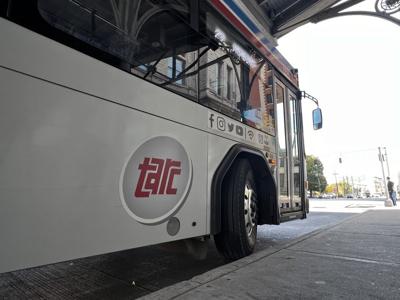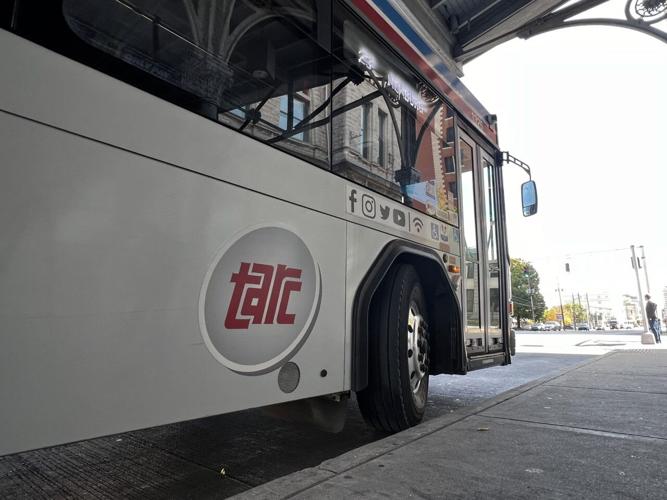LOUISVILLE, Ky. (WDRB) -- Facing a $30 million budget gap in the next two years, Louisville's public transportation provider will soon begin reducing its routes, a move its board chairman called a response to "significant financial challenges."
Louisville Mayor Craig Greenberg said in a news conference Monday that the Transit Authority of River City will lose about 20% of its annual revenue when funding from the American Rescue Plan comes to end years after the COVID-19 pandemic spurred the need for federal assistance. TARC said its board approved a plan it calls "Saturday Plus," meaning that the majority of its existing bus routes will shift to the level of service normally seen on Saturdays. That will mean fewer scheduled buses moving along routes every hour and less frequent service on weekdays.
TARC's four busiest routes — 4th Street, Dixie Rapid, Broadway and Preston Highway — will remain unaffected, with its usual 15-minute intervals.
"We have seen this coming," Ozzy Gibson, interim executive director of TARC, said Tuesday. "Many other years prior to that, TARC was always very lucky to have different types of grants that could be used to offset operating costs. Now, that well has run dry."
Greenberg joined members of Louisville Metro Council and Jefferson County Public Schools leadership Monday in announcing a plan to take advantage of TARC's cutback in order to bolster transportation for JCPS students.
"I believe there's an opportunity here, an opportunity to ensure that all TARC drivers continue to help support our community in a very important way to maintain a good paying job and at the same time help all of our JCPS Students and families," Greenberg said during a news conference Tuesday.
The Jefferson County School Board voted last week on to implement a plan that will cut transportation to all magnet and traditional schools, with the exception of Central and Western high schools, which both have a 75% threshold of students on free or reduced lunch.
For the last several years, JCPS has struggled to recruit enough bus drivers, resulting in buses running delayed, up to several hours. Last school year, the state's largest school district dealt with the same problems. So, to address the busing issues, in February 2023, Pollio began to campaign a plan that would change the district start times from just two, 7:40 a.m. and 9:05 a.m., to nine times ranging from 7:40 a.m. to 10:40 a.m. Most schools would start at 7:40 a.m., 8:40 a.m., or 9:40 a.m.
JCPS Superintendent Marty Pollio said staggering times allowed bus drivers enough time to complete a route before having to begin the next. However, the first day of school with new start times and bus routes, proved to be disastrous for the district. The first day was plagued with bus delays in the morning and the afternoon. Some students' buses never showed up that morning, and others didn't get dropped off from school that evening until almost 10 p.m.
JCPS decided to cancel classes for the remainder of that week and later extended that closure to include most of the following week as it implemented a staggered return for students. The process saw modest improvements over the course of the school year, but it became quickly apparent, the district said, that there simply weren't enough bus drivers to efficiently complete the routes.
So, during a news conference held Monday afternoon at Metro Hall, council members called for a partnership with JCPS to find an additional solution to the district's new plan.
"That stark financial reality, combined with a lack of strategic plan from prior leadership, has left the TARC board and management with no easy options," Greenberg said Monday. "Earlier today, the TARC Board of Directors approved a proposed budget that will maintain the solvency of TARC and also continue bus service for many Louisvillians who depend on the system, including paratransit riders."
However, the mayor said, the proposed operating budget includes a reduction in the frequency of TARC's routes, resulting in fewer bus drivers needed "in the near future."
"We as a community have depended on all of these TARC bus drivers for many years, and we want to be there for them in return," Greenberg said.
Because of this and JCPS' continued struggles filling bus driver vacancies even though it has the funding available, Greenberg said he penned a letter to TARC Board of Directors on Monday calling for a meeting to "start working through the details of how we can offer impacted TARC drivers the opportunity to be JCPS bus drivers and address their transportation challenges."
The plan was welcomed by Pollio, although he cautioned it only offers a solution for next school year. Both Pollio and Greenberg announced a verbal commitment to meet this week.
"If we are able to have a solution that we can work on that gets us next year, the data is indicating this is going to be a problem 12 months from now, 24 months from now, 60 months from now," Pollio said.
However, the TARC union isn't on board. Union leaders say their drivers were blindsided by the potential cuts.
"It is not a pay increase (and) it is not a better place to work," said Lillian Brents with the union. "At TARC, our safety is also challenging. That's why the shortage of drivers is everywhere.
"To ask somebody whose been at a company for 20 years, 16 years, or three days to start over here ... just because it's more convenient for you, without exploring all the facts or opportunities, it's very disrespectful to my members."
Tuesday evening, a Metro Council committee got a clearer picture of the agency's finances. Eighty-seven percent of TARC's budget is funded by the occupational tax and federal COVID funding, which runs out next July.
The occupational tax rate can only be changed with a tax levy that voters would decide on. Metro Council could allocate more of that tax revenue to TARC, but that would take money from JCPS. If nothing changes, projections show TARC losing $28 million every year by June 2026.
Related Stories:
- City offers looming TARC layoffs as a solution to hire more JCPS bus drivers
- President of JCPS bus driver union says school board 'had to' make decision they did
- JCPS board votes to cut transportation to magnet, traditional schools with exceptions following heated debate
Copyright 2024 WDRB Media. All Rights Reserved.














